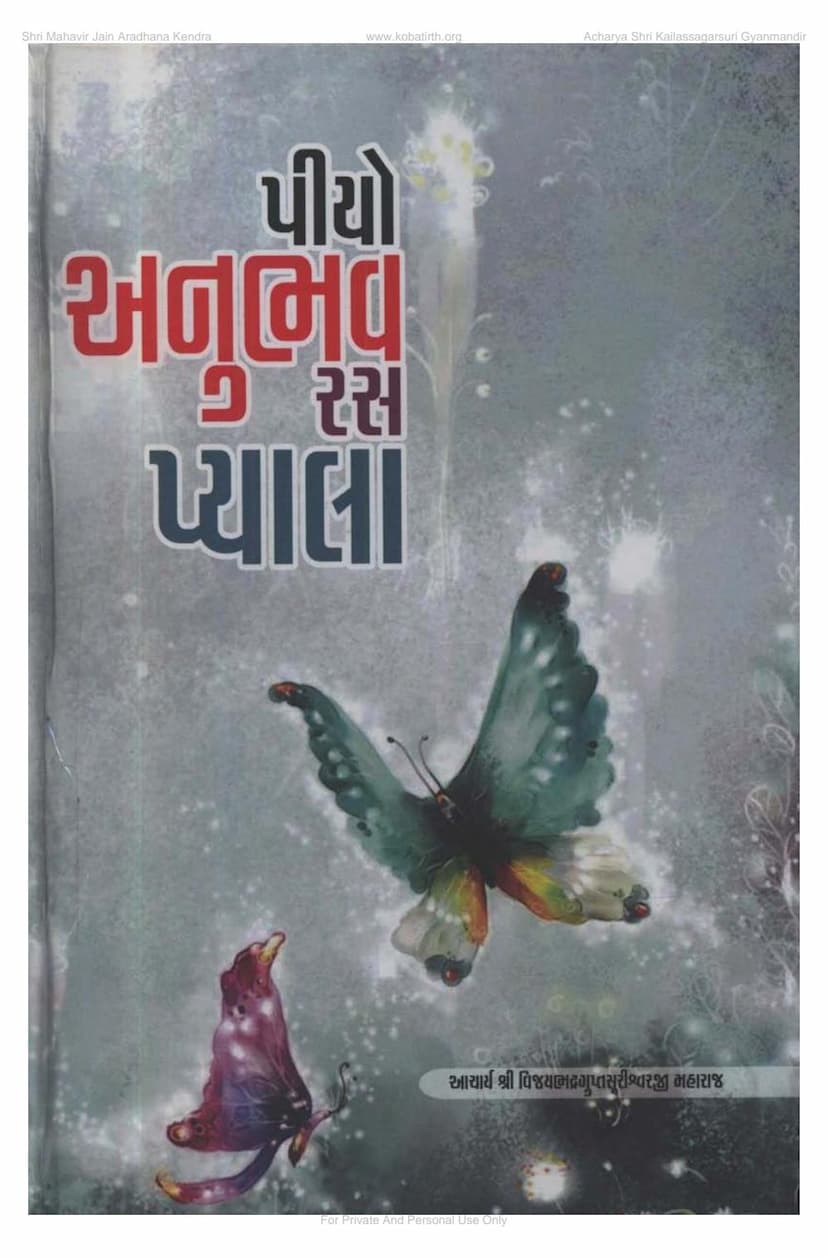Piyo Anubhav Rasha Pyala
Added to library: September 2, 2025

Summary
Here's a comprehensive summary of the Jain text "Piyo Anubhav Ras Pyala" (Drink the Nectar of Experience) by Acharya Shri Bhadraguptasuri, based on the provided pages:
Book Title: Piyo Anubhav Ras Pyala (Drink the Nectar of Experience) Author: Acharya Shri Bhadraguptasuri (as commentator) Original Author of the text commented upon: Acharya Shri Vijaysinh Suri Publisher: Shri Mahavir Jain Aradhana Kendra, Koba Catalog Link: https://jainqq.org/explore/008919/1
Overall Summary:
"Piyo Anubhav Ras Pyala" is a profound commentary by Acharya Shri Bhadraguptasuri on the "Samyashatak" (Hundred Verses on Equanimity) originally composed by Acharya Shri Vijaysinh Suri. The book, published by Shri Mahavir Jain Aradhana Kendra, Koba, serves as a guide to achieving inner peace, spiritual equanimity, and ultimately, liberation (moksha) through the principles of Jainism. The commentary emphasizes the importance of understanding and practicing equanimity (samyata) in all aspects of life, offering a philosophical and practical roadmap for spiritual seekers.
Key Themes and Content:
The book is structured around the verses of the "Samyashatak," with Acharya Bhadraguptasuri providing detailed explanations and interpretations. The core message revolves around the cultivation of equanimity, detachment, and spiritual wisdom.
-
The Nature of Equanimity (Samata/Samyata): The commentary delves into the essence of equanimity as a state of being free from attachment and aversion, unaffected by worldly pleasures and pains. It describes equanimity as an inherent quality of the soul that needs to be rediscovered and cultivated.
-
Overcoming Attachments and Desires: A significant portion of the text focuses on identifying and overcoming the root causes of suffering, primarily attachments (mamata), desires (trishna), and passions (kashayas) like anger, ego, deceit, and greed. Various verses illustrate how these impurities cloud the soul's true nature and lead to a cycle of birth and death.
-
The Role of Renunciation (Vairagya) and Detachment (Nirmamata): The text strongly advocates for detachment from worldly possessions, relationships, and even the body. It explains that true happiness lies not in external acquisitions but in inner contentment and freedom from longing. The concept of "nirmamata" (non-possessiveness) is highlighted as a crucial step towards spiritual liberation.
-
The Power of Knowledge and Contemplation: The importance of self-inquiry, study of scriptures, and constant contemplation of truth (tattva vichar) is emphasized as a means to gain the wisdom necessary to overcome illusions and attachments. The commentary suggests that through right knowledge, one can distinguish between the real (soul) and the unreal (world).
-
The Limitations of External Actions: While external practices like austerities (tapas) and rituals are acknowledged, the commentary stresses that without the inner foundation of equanimity and detachment, these external actions are ultimately futile, like offering oblations into ashes.
-
Controlling the Senses and the Mind: The verses offer guidance on controlling the senses (indriyas) and the mind (manas), which are depicted as powerful forces that can lead one astray if not properly managed. The text likens the mind to a restless elephant or a swift wind, and suggests methods like contemplation and equanimity to bring it under control.
-
The Illusion of Worldly Happiness: The book repeatedly highlights that worldly happiness derived from sensory pleasures is fleeting, artificial, and ultimately leads to suffering. It contrasts this with the pure, inherent bliss of the soul that can be attained through spiritual discipline.
-
The Path to Liberation: The ultimate goal presented is liberation from the cycle of birth and death. This is achieved by purifying the soul, eradicating the karmic obstructions, and realizing one's true, blissful, and omniscient nature. Equanimity, detachment, and right knowledge are presented as the direct path to this ultimate state.
-
Commentary's Approach: Acharya Bhadraguptasuri's commentary is characterized by its depth, clarity, and practical application. He meticulously breaks down each verse, explaining its philosophical implications and offering relatable analogies and examples to make the profound teachings accessible to a wide audience. The commentary also references other Jain scriptures and philosophical concepts to enrich the understanding.
Biographical Note on Acharya Shri Bhadraguptasuri:
The introductory pages provide a biographical sketch of Acharya Shri Bhadraguptasuri. He was born as Mulchandbhai in 1989 (V.S.) and initiated into the Jain monastic order at the age of 18. He possessed a deep understanding of the 45 Agamas and was well-versed in Indian and Western philosophy, poetry, and literature. His literary journey began at 20 and continued until his demise. He was known for his cheerful disposition, compassionate nature, and dedication to the welfare of society, particularly the youth. He attained his final abode in 1999 (V.S.) after facing various ailments.
Republishing and Gratitude:
The preface indicates that the Shri Mahavir Jain Aradhana Kendra, Koba, undertook the re-publication of this work after the dissolution of the original publisher, Vishwa Kalyan Prakashan. This initiative was taken to ensure that Acharya Shri Vijaysinh Suri's valuable literature remains accessible to the public, with the blessings of Acharya Shri Padmsagarsuri. The Kendra expresses gratitude to the Narottamdas Lalbhai family for their generous financial support for this edition.
In essence, "Piyo Anubhav Ras Pyala" is a spiritual treasure trove, guiding individuals on the path of self-realization through the timeless wisdom of equanimity, a cornerstone of Jain philosophy.